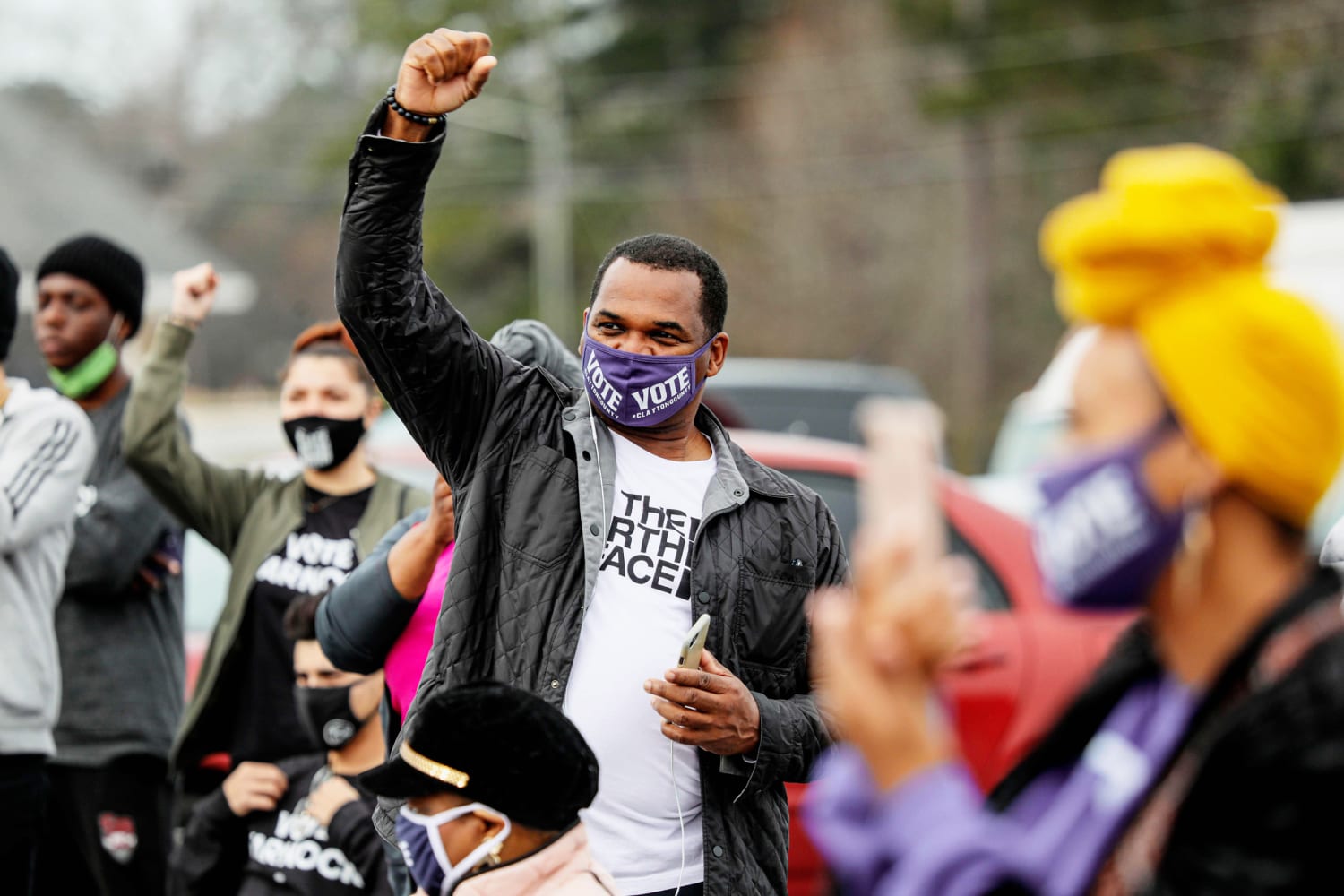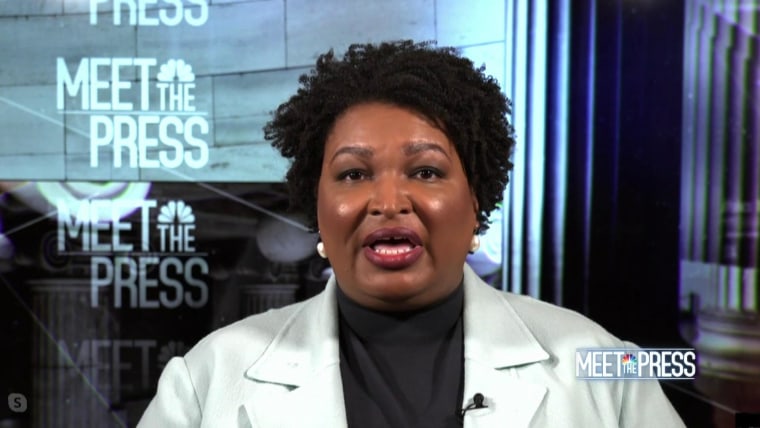When Democrat Raphael Warnock used his pet beagle in a pair of viral ads to answer attacks by his Republican rival, Sen. Kelly Loeffler, it was more than an ordinary campaign ad.
In both ads, Warnock walks his dog in a suburban neighborhood while wearing a sweater and a vest jacket on an autumn morning. A series of attacks by Loeffler labeling him a radical leftist appears in the video.
“I think Georgians will see her ads for what they are, don’t you?” he asks in one ad. He then throws the dog poop bag in the garbage, and the beagle barks and licks Warnock’s face.
The ads by Warnock, a Black pastor running to be the first Black senator in a state with one of the largest Black populations in the country, appeared to be a calculated attempt to neutralize racial attacks against him and a clear illustration of the changing demographics of the state, political observers and experts said.
“It’s because that is Black Georgia now — it is a suburban Georgia. It’s not nearly as rural anymore, and it’s not as much inner city,” said Matthew Hauer, a professor of sociology at Florida State University who was previously head of the Applied Demography Program at the University of Georgia. “You have a lot of neighborhoods that are 30 percent and 35 percent Black now that 30 years ago would have been 5 percent.”
Seven of the 10 counties in the country with the fastest-growing Black populations are near Atlanta, according to a Pew Research Center analysis of 2018 census population data. And several populous counties in the state, such as Gwinnett and Cobb, flipped to Democrats in 2016 and again in 2020 with larger margins. Democratic support has also increased in other suburban counties since 2016.
It’s partly those demographic shifts, including a massive grassroots get-out-the-vote infrastructure built over years by Black activists, that delivered the state to a Democratic presidential candidate for the first time since 1992 — and they may give Democrats a boost in Tuesday’s twin runoffs. Besides Loeffler and Warnock, Democrat Jon Ossoff is also taking Republican David Perdue, whose term expired on Sunday.
Experts attributed the shift largely to what they described as reverse migration, in which many Black families who resettled in Northern cities to start over again during the Great Migration from 1916 to 1970 have returned to the South. The influx of new residents over decades, which includes growing Asian American and Latino populations, has changed the racial makeup of states in the South like Georgia and Atlanta’s suburbs in particular. They are mixed economically, encompassing working-class people and high-income professionals.
“All major race groups grew in the 1990s and the 2000s,” Hauer said. “The overwhelming amount of that growth is in nonwhite, non-Hispanic populations.”
He added: “And so those groups, they’ve been there for a while now. And they start to have a little bit of cachet. They bought houses, they have a little bit more investment in the community, their kids are now growing up and going to college, and they’re starting to vote.”
Some are lawyers, nurses and doctors, while others are teachers, small-business owners and entrepreneurs — attracted by jobs, relatively affordable housing and schools.
Jerry Shannon, a geography professor at the University of Georgia, explained, “The result of all that is what you see in some of the election results, where, say, suburban Atlanta has gone from being pretty Republican to being much more Democratic-leaning. And much of that has to do with all those trends.”
Download the NBC News app for breaking news and politics
Gwinnett County, just outside Atlanta, is a case in point. The county has nearly tripled its population since 1990, and it is now the state’s second-most populous county. Thirty years ago, the county had around 350,000 residents, and Black residents made up 5 percent of the population, Asians made up 3 percent and Hispanics were less than 2 percent. Now, the population — nearly 940,000 — is 30 percent Black, 22 percent Hispanic and about 13 percent Asian.
“With that diversity comes a shift politically,” said state Rep. Jasmine Clark, a Democrat who represents Gwinnett County. “The more people of color that you have in your area, the more likely that you’re going to trend a little bluer.”
Clark, who is also Black, narrowly defeated Clay Cox, a white incumbent Republican, by 51 percent to 49 percent in 2018. In November, she was re-elected by 55 percent to 45 percent.
But the demographic shifts are only part of the story. Andra Gillespie, a political science professor at Emory University in Atlanta, also pointed to increased voter registration and turnout. She credits voting rights activists like Stacey Abrams, who has been widely applauded for her work in transforming Georgia into a battleground state.
“I have never seen so many signs for Democrats in my neighborhood, I use to never see that,” said voter Brenda Kennedy, who is Black and has lived in Savannah for around 30 years. “And that’s how I know Georgia is changing.”
Quentin James, one of the founders of The Collective PAC, an organization dedicated to electing Black lawmakers, said organizing helps make Black voters a larger share of the electorate, particularly in states like Georgia.
“Black voters are showing up,” James said. “Part of it is when we give Black voters something to vote for, great candidates with a great message, they show up.”
He added: “We’ve got to change the attitudes of white voters. That is something that the party has to do, but we shouldn’t do that work at the expense of engaging and turning out Black voters. And that’s been the challenge.”
James said his organization plans to help move about 26,000 voters to the polls through free ride-sharing programs — more than double the number in the general election — among other voter mobilization efforts. He said building an infrastructure of voters of color has been key.
“I think if anybody’s looking for lessons learned from, I think, around the country, it is in a place like Georgia and a place like Arizona and a place like Nevada — Democrats have been quietly investing in changing the electorates there,” he said.
Some Republicans are also hoping to tap into the diversifying electorate.
Scott Johnson, who serves on the Georgia Board of Education, said Republicans have work to do in appealing to diverse communities. He lives in Marietta, a booming suburb of the Atlanta metropolitan area that fueled the Democratic shift.
“On the street I live on — it’s a short street, there are seven houses on there — there are three African American families, a Middle Eastern family and three caucasian families who kind of look like me,” Johnson said after attending a Loeffler rally earlier in the runoff campaign. “And that’s great. Because we’re all friends. And I believe we all have the same values, largely.”
Nse Ufot, the CEO of the New Georgia Project, which Abrams founded, said the group has registered more than a half-million Black voters, as well as Asian and Hispanic voters. The group has been laser-focused on registering more voters ahead of the runoffs and making sure they get to the polls.
“I will say that the demographic shifts are the fire and organizing is absolutely the accelerant,” Ufot said.
“Phone calls, text messages, knocking on their doors and postcards, as well as digital ads, all together,” she said. “We’ve been wild, annoying, and we’re turning it. And we’re doubling down on that so that people get to see going out to vote as a way to stop the phone calls.”
At the core of the strategy, she said, is an “aggressive research agenda” to drive intensive voter mobilization efforts to get voters off the sidelines.
“Just because we’re Black, just because we’re millennials and Gen Z and just because we’re women, doesn’t automatically make us experts in Black politics,” Ufot said.
She said that as a Georgia resident, she has seen the demographic shifts and the changes particularly around the Atlanta suburbs and rural parts of the state.
“I think that often when people hear ‘rural voters’ that it’s code in their minds for white conservatives, and not only are there white progressives in rural Georgia, but a bunch of Black people,” she said.
Source: | This article originally belongs to Nbcnews.com










